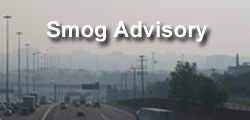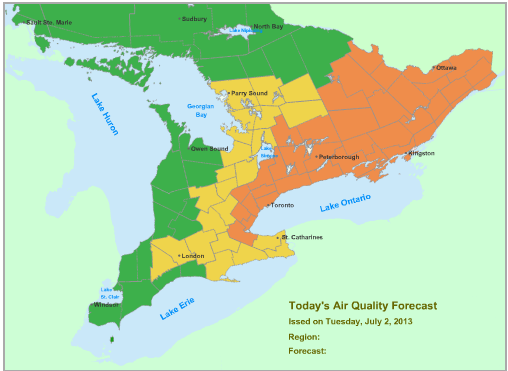This video presents “Quebec Forest Fires Trigger Smog Advisory for Ottawa”:
- A smog advisory was issued for most of eastern Ontario on Tuesday (July 2, 2013), including the City of Ottawa.

A SMOG ADVISORY* has been issued by the Ontario Ministry of the Environment for the following forecast regions for Tuesday July 2, 2013:
- City of Hamilton
- City of Toronto
- Halton – Peel
- York – Durham
The SMOG ADVISORY for the following forecast region(s) is still in effect:
- Bancroft – Bon Echo : (July 2, 2013)
- Belleville – Quinte – Northumberland: (July 2, 2013)
- Brockville – Leeds and Grenville: (July 2, 2013)
- City of Ottawa: (July 2, 2013)
- Cornwall – Morrisburg: (July 2, 2013)
- Kingston – Prince Edward: (July 2, 2013)
- Peterborough – Kawartha Lakes : (July 2, 2013)
- Prescott and Russell : (July 2, 2013)
- Renfrew – Pembroke – Barry’s Bay : (July 2, 2013)
- Smiths Falls – Lanark – Sharbot Lake: (July 2, 2013)
- Stirling – Tweed – South Frontenac: (July 2, 2013)

This smog advisory will remain in effect until further notice.
* A Smog Advisory means that there is a strong likelihood that there may be poor air quality within the next 24 hours due to ground-level ozone and/or particulate matter.
- AQI is an indicator of air quality, based on air pollutants that have adverse effects on human health and the environment.
- Smog is harmful to the lungs and heart.
- Even in healthy people, smog can reduce lung function.

- A Smog Advisory is related to the Air Quality Index (AQI), which rates how clean the air is.
- The AQI scale ranges from 0 to 100+.
- Higher numbers mean higher health risks.
- A Smog Advisory is issued in your region when the AQI is expected to reach 50 in the next 24 hours.
- It can be lifted once the AQI is expected to reach or drops below 50.
- Smog is made up of a complex mixture of air pollutants that are sometimes visible, such as a brownish-yellow haze over cities; sometimes not.
- The two main ingredients of smog are ground-level ozone (O3) and fine particulate matter (PM2.5).
- Smog, comprised of Ozone (O3) and/or Fine Particulate Matter (PM2.5), is primarily a summer phenomenon, occurring mostly in southern Ontario; however, PM2.5 can elevate smog levels during all months of the year.
-
For this reason, the ministry reports the AQI hourly, seven days a week; and continues to provide air quality forecasts daily.
-
The details of the smog forecast are as follows:
- The smog advisory has been expanded, and now includes eastern, and parts of southern Ontario as a result of forest fire smoke being transported from northern Quebec.
- A low pressure system, currently located southwest of the province, combined with a high pressure ridge over northwestern Ontario are forecasted to cause mainly cloudy skies and northeasterly winds across the province for today, July 2.
-
These conditions are expected to last into tomorrow morning, July 3, however as the systems move eastward, winds are forecasted to become southwesterly by tomorrow evening, clearing out the forest fire smoke.
-
- On Thursday, July 4, a high pressure ridge is forecasted to lie southeast of the province, causing southwesterly winds and increasing temperatures across the province.
-
Partly sunny skies and a slight chance of showers are expected as a result of an upper-level disturbance.
-
Good to moderate air quality is expected across the province.
-
During the smog episode, individuals may experience the following symptoms:
- eye irritation
- heavy outdoor exercise may cause respiratory symptoms such as coughing or shortness of breath
- people with heart or lung disease including asthma may experience a worsening of their condition
Please click here for details on air quality in Ontario.
Spare the Air Actions
During a smog advisory, there are a number of actions that you can take to help spare the air.
Travel tips – all year round:
- leave your car at home – walk, cycle, carpool or take public transit
- tele-conference instead of driving to meetings
- limit car trips by doing all your errands at once, and do not let your engine idle
- keep your car well tuned, check your tire pressure and drive at moderate speeds
Health tips:
- avoid exposure to vehicle exhaust fumes
- consult your doctor for specific health advice
- wear light clothing at work while air conditioning is reduced
- avoid strenuous exercise in the heat of the day
Electricity saving tips:
- save electricity at home by setting your air conditioner temperature a few degrees higher (health permitting) and
- turning off lights you are not using
Other pollution reduction tips:
- leave lawn mowing for another day
- restrict the use of gasoline-powered equipment
- delay using oil-based paints, solvents and cleaners
Please click on the following text to:
Please click here for more info about smog.
——————————————
You may also want to know:
- PocketWizard® Plus® III Radios’ Online Auction Until May 17 (07:33:27 PDT): Fundraiser for Breast Cancer Community (a limited edition of G-Wiz Squared gadget bags in the same Tutu Pink color will be available for purchase in limited quantities at the Carey Foundation website beginning in June, 2013 to support cancer patients)
- Toronto: Eglinton Connects Survey Until Jun.14, Safety Open Houses Jun.10-13, Cultural Spaces Meetings Jun-Jul.2013
- You’re Invited: Celebratory Events in Toronto June 2013 (Bike Works DIY Bike Repairs – Saturdays and Sundays throughout the summer)
- You’re Invited: Toronto’s Great Events May 18 – 21 and Victoria Day May 20, 2013 (Heritage Toronto Tours April – October 2013)
- You’re Invited: Spring & Green Events in Ontario May 10 – 12, 2013 (ROMwalks May 1, 2013 – October 20, 2013)
